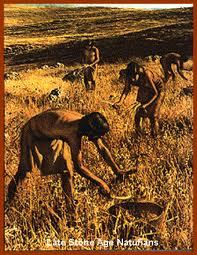The scientists have finally figured out what any self-respecting beer drinker has known for eons – that beer is a civilized and civilizing drink. On the weekend an article ran in the Edmonton Journal and elsewhere (here is the story) touting a new study conducted by an archeology team based at Simon Fraser University (it would have to be Canadians deciding to research the origins of beer, wouldn’t it?) demonstrating that beer was a key factor in the development of human culture 10,000 or so years ago. The article is brief, so doesn’t give us much detail, but we know the researchers were examining archeological evidence from the so-called “Natufian” culture on the eastern shores of the Mediterranean.
Their argument is that the desire for a more stable source of grain for brewing beer was a driver behind settlement and plant domestication. The purpose of beer at the time, it has long been known, was mainly to be consumed at feasts, religious celebrations and other important cultural rites.
I find this story particularly satisfying because when I teach beer history at seminars and tastings, I often discuss the link between beer and agriculture. I like to tell attendees that any old savage can make wine, but it takes civilization to make beer. The reason for this is simple, and borne out by the study. Grapes grow wild and contain yeast on the surface of their skin, meaning just leaving a bunch of grapes (or other fruit) to become overripe will naturally spark fermentation. Beer, being based in fermented grain, requires both a reliable supply of that grain – which is difficult to achieve when harvesting only wild varieties – and requires some additional processing to achieve fermentation (what we today call malting and mashing). This is part of the reason why wine is older. It also suggests a link between agriculture and beer.
This study is not ground-breaking for making the link between beer and civiliation – that was established decades ago (which is why I am confident teaching it – I can read it in books rather than spend painstaking months crouched over ancient artifacts trying to understand what they mean – man, archeologists have a tough job!). What this study, apparently, brings to the table is an hypothesis that not only are the linked, but that beer helped motivate ancient societies to settle down and plant some grains. Which is interesting.
And, of course, we know where planting grains leads to. Double IPAs, oak-aged stouts and dopplebocks. Civilization, indeed!


March 25, 2013 at 10:50 AM
A couple of links to lengthier articles:
http://news.nationalpost.com/2013/03/21/how-beer-fuelled-the-feasting-culture-that-led-to-civilization/
http://www.nytimes.com/2013/03/17/opinion/sunday/how-beer-gave-us-civilization.html?_r=0
March 26, 2013 at 12:33 PM
I have always thought/know beer to be older – that proof of wine creation is much later. Who/what/when/where/why do you say beer is the younger of the two?
Cheers!
March 26, 2013 at 1:05 PM
Good question, Roughshod. There are a number of sources I draw from for that observation, but really the best work in recent years has been performed by Patrick McGovern, who is a biomolecular anthropologist. His 2009 book, “Uncorking the Past” is a very thorough examination of the origins of beer, wine and other beverages. Here is a link to it: http://www.ucpress.edu/book.php?isbn=9780520267985
March 30, 2013 at 11:25 AM
Thanks!